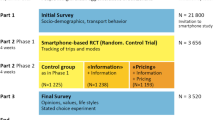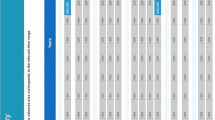Abstract
The household travel survey (HTS) finds itself in the midst of rapid technological change. Traditional methods are increasingly being sidelined by digital devices and computational power—for tracking movements, automatically detecting modes and activities, facilitating data collection, etc.. Smartphones have recently emerged as the latest technological enhancement. FMS is a smartphone-based prompted-recall HTS platform, consisting of an app for sensor data collection, a backend for data processing and inference, and a user interface for verification of inferences (e.g., modes, activities, times, etc.). FMS, has been deployed in several cities of the global north, including Singapore. This paper assesses the first use of FMS in a city of the global south, Dar es Salaam. FMS in Dar was implemented over a 1-month period, among 581 adults chosen from 300 randomly selected households. Individuals were provided phones with data plans and the FMS app preloaded. Verification of the collected data occurred every 3 days, via a phone interview. The experiment reveals various social and technical challenges. Models of individual likelihood to participate suggest little bias. Several socioeconomic and demographic characteristics apparently do influence, however, the number of days fully verified per individual. Similar apparent biases emerge when predicting the likelihood of a given day being verified. Some risk of non-random, non-response is, thus, evident.




Similar content being viewed by others
References
Alexander, L., Jiang, S., Murga, M., González, M.C.: Origin–destination trips by purpose and time of day inferred from mobile phone data. Transp. Res. Part C Emerg. Technol. 58, 240–250 (2015)
Ampt, E.S., Ortúzar, J.D.D.: On best practice in continuous large-scale mobility surveys. Transp. Rev. 24(3), 337–363 (2004)
Bachu, P., Dudala, T., Kothuri, S.: Prompted recall in global positioning system survey: proof-of-concept study. Transp. Res. Rec. J. Transp. Res. Board 1768, 106–113 (2001)
Behrens, R., Masaoe. E.: Towards improved travel diary survey instruments in African cities: findings of a comparative experimental application of trip-based, placebased and activity-based diaries in Cape Town and Dar Es Salaam. In: Southern African Transport Conference, Pretoria. http://www.fut.se/download/18.778e24d112a169fd1c180006122/Behrens+-+Towards+improved+travel+diary+survey+instruments.pdf (2009)
Behrens, R., Diaz-Olvera, L., Plat, D., Pochet, P.: Collection of passenger travel data in Sub-Saharan African cities: towards improving survey instruments and procedures. Transp. Policy 13(1), 85–96 (2006)
Behrens, R.D., McCormick, D., Mfinanga, D. (eds.): Paratransit in African cities: Operations, Regulation and Reform. Routledge, Abingdon (2015)
Bricka, S.G., Sen, S., Paleti, R., Bhat, C.R.: An analysis of the factors influencing differences in survey-reported and GPS-recorded trips. Transp. Res. Part C Emerg. Technol. 21(1), 67–88 (2012)
Cameron, A.C., Trivedi, P.K.: Microeconometrics: Methods and Applications. Cambridge University Press, Cambridge (2005)
Cottrill, C., Pereira, F., Zhao, F., Dias, I., Lim, H.B., Ben-Akiva, M., Zegras, C.: Future mobility survey: experience in developing a smart-phone-based travel survey in Singapore. Transp. Res. Rec. 2354, 59–67 (2013)
de Leeuw, E.D., de Heer, W.: Trends in household survey nonresponse: a longitudinal and international comparison. In: Groves, R.M., Dillman, A.D., Eltinge, J., Little, R. (eds.) Survey nonresponse, pp. 41–54. Wiley, New York (2002)
Demissie, M.G., Phithakkitnukoon, S., Sukhvibul, T., Antunes, F., Gomes, R., Bento, C.: Inferring passenger travel demand to improve urban mobility in developing countries using cell phone data: a case study of Senegal. IEEE Trans. Intell. Transp. Syst. 17(9), 2466–2478 (2016)
Economic and Social Research Foundation (ESRF).: Tanzania Human Development Report 2014. United Nations Development Programme and Government of the United Republic of Tanzania, Dar es Salaam (2015)
Filmer, D., Pritchett, L.H.: Estimating wealth effects without expenditure data—or tears: an application to educational enrollments in states of India. Demography 38(1), 115–132 (2001)
Fournier, D.A., Skaug, H.J., Ancheta, J., Ianelli, J., Magnusson, A., Maunder, M.N., Nielsen, A., Sibert, J.: AD model builder: using automatic differentiation for statistical inference of highly parameterized complex nonlinear models. Optim. Methods Softw. 27(2), 233–249 (2012)
Greene, W.H.: Econometric Analysis. Pearson Education India, Bangalore (2003)
GSMA Intelligent: The Mobile Economy Africa 2016. https://www.gsmaintelligence.com/research/?file=3bc21ea879a5b217b64d62fa24c55bdf&download (2016)
Guevara, C.A.: Critical assessment of five methods to correct for endogeneity in discrete-choice models. Transp. Res. Part A Policy Pract. 82, 240–254 (2015)
Hall, D.B.: Zero-inflated poisson and binomial regression with random effects: a case study. Biometrics 56(4), 1030–1039 (2000)
Hanson, S., Hanson, P.: The travel-activity patterns of urban residents: dimensions and relationships to sociodemographic characteristics. Econ. Geogr. 57(4), 332–347 (1981)
Hensher, D.A., Greene, W.H.: The mixed logit model: the state of practice. Transportation 30(2), 133–176 (2003)
Jiang, S., Ferreira, J., González, M.C.: Activity-based human mobility patterns inferred from mobile phone data: a case study of Singapore. IEEE Trans. Big Data 3(2), 208–219 (2017)
Kagerbauer, M., Manz, W., Zumkeller, D.: Analysis of PAPI, CATI, and CAWI methods for a multiday household travel survey. In: Zmud, J., Lee-Gosselin, M., Munizaga, M., Carrasco, J.A. (eds.) Transport survey methods: best practice for decision making, pp. 289–304. Emerald Group Publishing Limited, Bingley (2013)
Kiunsi, R.: A review of traffic congestion in Dar Es Salaam City from the physical planning perspective. J. Sustain. Dev. 6(2), 94–103 (2013)
Kiunsi, R.: The constraints on climate change adaptation in a city with a large development deficit: the case of Dar Es Salaam. Environ. Urban. http://eau.sagepub.com/content/early/2013/07/08/0956247813489617.abstract (2013b)
Lambert, D.: Zero-inflated poisson regression, with an application to defects in manufacturing. Technometrics 34(1), 1–14 (1992)
Madre, J.-L., Axhausen, K.W., Brög, W.: Immobility in travel diary surveys. Transportation 34, 107–128 (2007)
Masaoe, E.N., Del Mistro, R.F., Makajuma, G.: Travel behaviour in Cape Town, Dar Es Salaam and Nairobi Cities. SATC 2011. http://www.repository.up.ac.za/handle/2263/17373 (2011)
McDonald, N., Porter, C., Gorham, R.: Availability of travel forecasting methods and data for air quality planning in developing countries. Transp. Res. Rec. 1859, 110–116 (2003)
McGuckin, N., Keyes, M.A., Liss, S.: Hang-ups: looking at non-response in telephone surveys. US Department of Transportation: https://www.fhwa.dot.gov/ohim/hang_ups.htm (2004)
Melbye, D.C., Møller-Jensen, L., Andreasen, M.H., Kiduanga, J., Busck, A.G.: Accessibility, congestion and travel delays in Dar Es Salaam–a time–distance perspective. Habitat Int. 46, 178–186 (2015)
Mkalawa, C.C., Haixiao, P.: Dar Es Salaam City temporal growth and its influence on transportation. Urban Plan Transp. Res. 2(1), 423–446 (2014)
Moran, Patrick A.P.: Notes on continuous stochastic phenomena. Biometrika 37(1/2), 17–23 (1950)
National Bureau of Statistics (NBS).: Basic Demographic and Socio-Economic Profile Report: Tanzania Mainland. United Republic of Tanzania, Ministry of Finance (2014)
Nawaranthne, K., Zhao, F., Pereira, F.C., Zegras, C.C., Ben-Akiva, M.:The impact of GPS based outdoor activity detection on smartphone battery life. In: 10th International Conference on Transport Survey Methods, Australia (2014)
Ndibatya, I., Coetzee, J., Booysen, T.: Mapping the informal public transport network in Kampala with smartphones: international. Civil Eng. Siviele Ingenieurswese 25.1(2017), 35–40 (2017)
Nkurunziza, A., Zuidgeest, M., Brussel, M., Van Maarseveen, M.: Modeling commuter preferences for the proposed bus rapid transit in Dar-Es-Salaam. J. Public Transp. 15(2), 5 (2012)
Ortúzar, J.D.: Travel survey methods in latin america. In: Stopher P., Stecher C. (eds.) Travel Survey Methods. pp. 1–18 (2006)
Pinelli, F., Nair, R., Calabrese, F., Berlingerio, M., Di Lorenzo, G., Sbodio, M.L.: Data-driven transit network design from mobile phone trajectories. IEEE Trans. Intell. Transp. Syst. 17(6), 1724–1733 (2016)
Poushter, J.: Smartphone Ownership and Internet Usage Continues to Climb in Emerging Economies. Pew Research Center. http://www.diapoimansi.gr/PDF/pew_research%201.pdf (2016)
Rieser-Schüssler, N., Axhausen, K.W.: Self-tracing and reporting: state of the art in the capture of revealed behaviour. Handbook of Choice Modelling, pp. 131–151. Edward Elgar Publishing, Cheltenham (2014)
Saddier, S., Patterson, Z., Johnson, A., Chan, M.: Mapping the Jitney network with smartphones in Accra, Ghana: the AccraMobile experiment. Transp. Res. Rec. J. Transp. Res. Board 2581, 113–122 (2016)
Schafer, A.: Regularities in travel demand: an international perspective. J. Transp. Stat. 3(3), 1–31 (2000)
Shen, L., Stopher, P.R.: Review of GPS travel survey and GPS data-processing methods. Trans. Rev. 34(3), 316–334 (2014)
Skaug, H., Fournier, D., Nielsen, A., Magnusson, A., Bolker, B.: Generalized linear mixed models using AD model builder. R Package Version 0.7 2 (2012)
Stopher, P.R.: Use of an activity-based diary to collect household travel data. Transportation 19, 159–176 (1992)
Stopher, P., Fitzgerald, C., Xu, M.: Assessing the accuracy of the Sydney household travel survey with GPS. Transportation 34(6), 723–741 (2007)
Weiner, E.: Urban Transportation Planning in the United States: History, Policy, and Practice, 4th edn. Springer, New York (2013)
Wolf, J., Wilhelm, J., Casas, J., Sen, S.: A case study: multiple data collection methods and the NY/NJ/CT regional travel survey. Transport Survey Methods: Best Practice for Decision Making, pp. 71–90. Emerald Group Publishing Limited, Bingley (2013)
Zhao, F., Pereira, F.C., Ball, R., Kim, Y., Han, Y., Zegras, C., Ben-Akiva, M.: Exploratory analysis of a smartphone-based travel survey in Singapore. Transp. Res. Rec. 2494, 45–56 (2015)
Acknowledgements
The data collection for this research was supported by an award from the World Bank Group Big Data Innovation Challenge. Additional research support was provided by the Singapore National Research Foundation through the Singapore–MIT Alliance for Research and Technology Center for Future Urban Mobility.
Author information
Authors and Affiliations
Corresponding author
Appendix
Appendix
Following Filmer and Pritchett (2001), we construct a linear wealth index for the surveyed households using asset ownership indicators. We apply principal components analysis (PCA) and calculate the wealth index based on the normalized variables and their respective loadings (Table 7) on component 1.
Rights and permissions
About this article
Cite this article
Zegras, P.C., Li, M., Kilic, T. et al. Assessing the representativeness of a smartphone-based household travel survey in Dar es Salaam, Tanzania. Transportation 45, 335–363 (2018). https://doi.org/10.1007/s11116-017-9851-6
Published:
Issue Date:
DOI: https://doi.org/10.1007/s11116-017-9851-6




